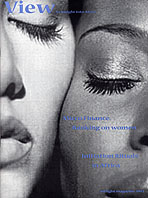23 July 2003
MediaNews 10 - July 2003
View – hardly your ordinary magazine
International students challenge the conspiracy of silence
By A' Eysha Kassiem
From the outside it hardly appears to be your ordinary magazine. Instead of the face that usually stare back at you from magazine covers, you now see two models with their eyes closed.
It is symbolic of the reader who has a limited knowledge of the continent and its current affairs.  | | View - an insight into Africa |
View
View, the new inflight-magazine produced by a group of international journalism
students, is aimed at creating a broader understanding of Africa. It allows the reader, airpassengers to Africa, to develop or broaden his or her own vision of a continent that so few are ready to face.
project to create cross-cultural awareness
The magazine is the result of what has been dubbed a 'cultural laboratory'; a journalism exchange project in the Netherlands (Fontys Hogeschool Journalistiek Tilburg) with the aim to achieve cross-cultural awareness. This year the project involved a group of forty students, half of whom were representatives from institutions in France, Slovakia, Britain, Ireland and South Africa. After three months of theoretical and practical study the project came to an end last June.
doomy portrayal of Africa
When the exchange project started in 1997, it was focussed on Europe and on the European Union. Three years later this was changed to Africa.
'Africa is often ignored,' Richard Ton, co-ordinator of the project explained. 'There’s this perception that Africa brings only disasters and diseases and that Africa is still in darkness.'
He said the students were expected to question the 'conspiracy of silence' around Africa. They should ask why it is only newsworthy when there is a good percentage of dead people in the region.
six weeks of intensice training and research
View was the result of six weeks of intensive learning and research on topics surrounding Africa. The period included a mixture of events such as visiting exhibitions, role-playing, video materials and guest speakers.
writing stories about a place you never visited
However, second-year student Kevin Sewell said it was difficult to write articles about a place he had never visited before. As an European student, he did not feel as though he could do justice to the stories.
Third year student and editor-in-chief of the magazine, Koen Guiking, agreed. He added that European students who knew 'nothing' about Africa produced content that may have had a new angle to them but was often based on a 'second hand idea' that had already been explored.
knowledge
Guiking believed that the project had taught students how to be resourceful. It had contributed to a greater knowledge about the current African affairs. This would enable them to further understand the unfolding events in Africa.
learning how to deal with different cultures
Megan Kakora, fellow editor-in-chief of the magazine and second year South African student, said: 'A lot of it was also about learning how to deal with different cultures.' Most students agreed. They said that the diversity of the group had been the biggest highlight of the project, as the international contacts made would prove to be invaluable.
breaking down preconceived notions
Ton said the personal reflections and perceptions of students before and after the project had shown a development in thinking and in breaking down the preconceived notions of Africa.
understand your own culture
Foreign students, he said, could look at their own countries from outside its borders. They get a better view of the region and return home with different perspectives. 'By comparing larger cultures, students are able to look at their own culture and understand it a bit better', he concluded. At the request of NiZA partner Peninsula Technikon (Cape Town) NiZA has financed the participation of the South African exchange students.
The international exchange programme is an initiative of Fontys Hogeschool Journalistiek Tilburg in The Netherlands.
A’Eysha Kassiem, a South African student in journalism, was one of the students that participated in the project.
|

